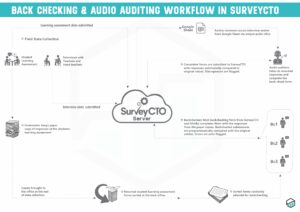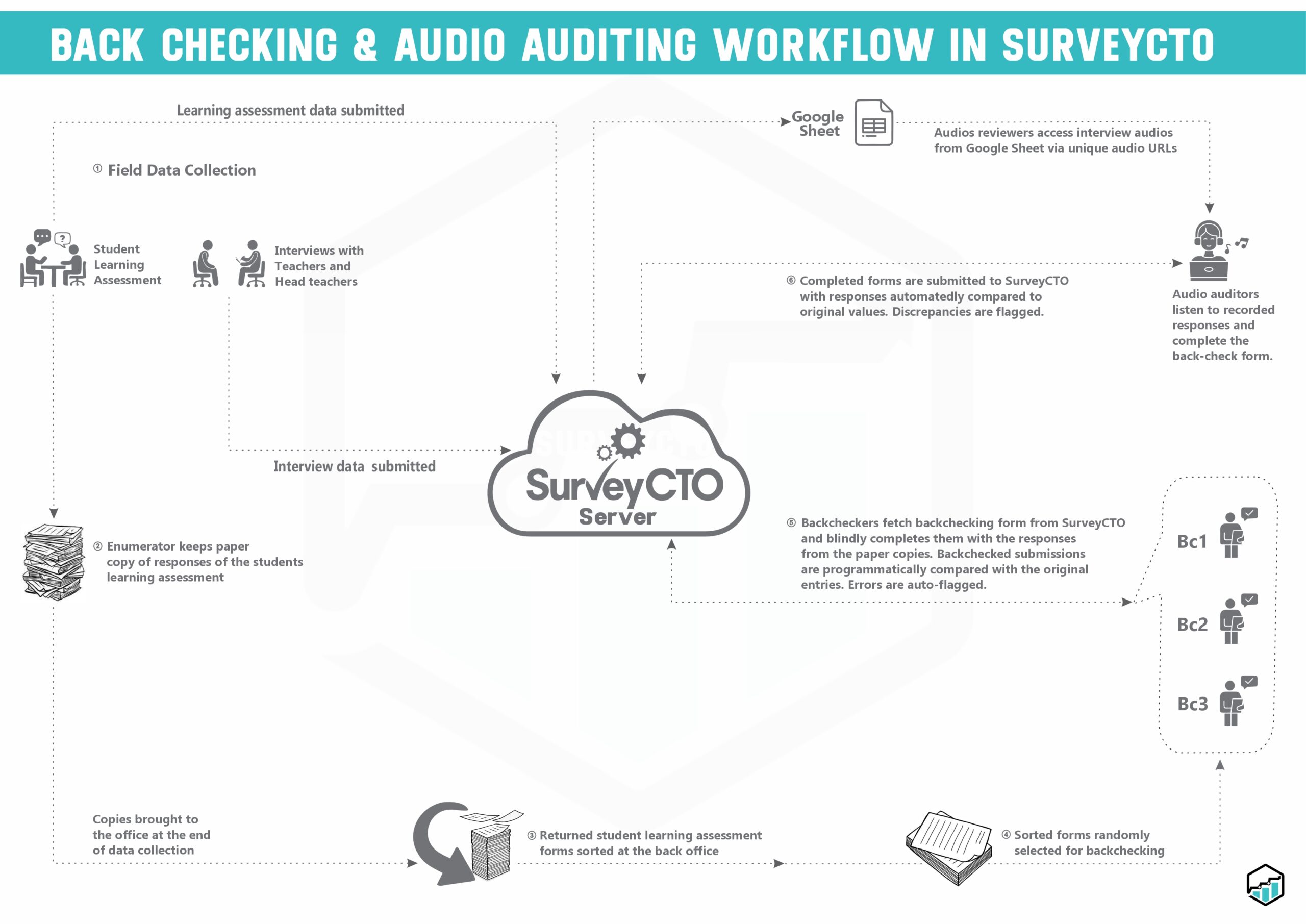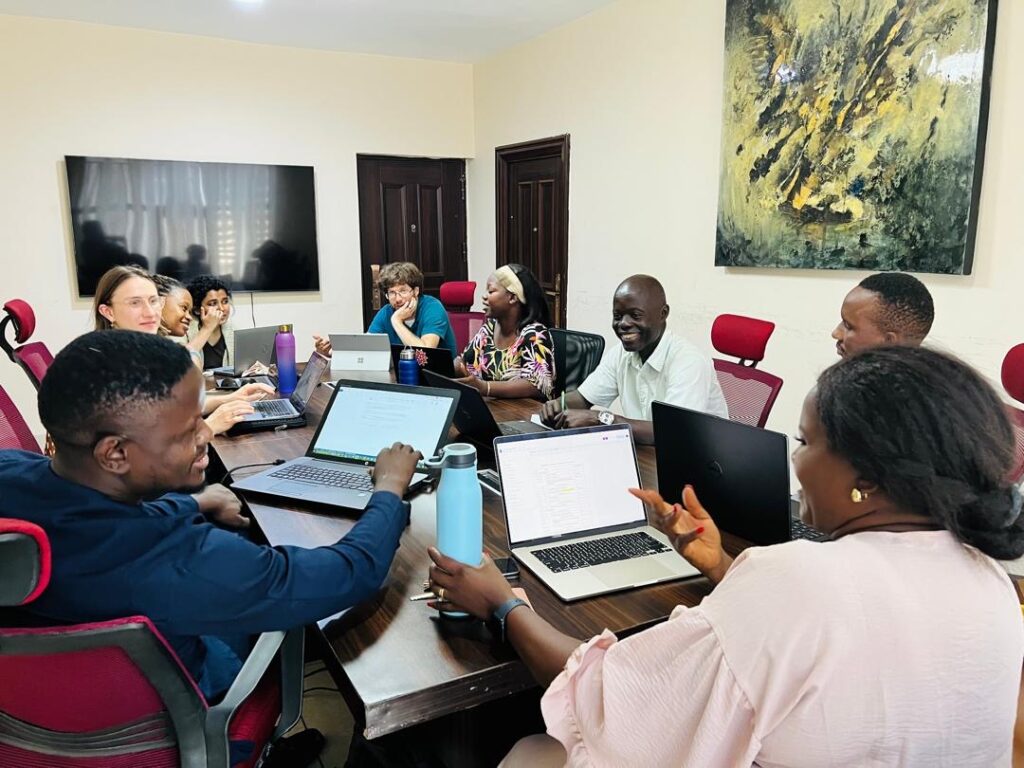Introduction
Data credibility is at the heart of evidence-based decision-making. Yet, large-scale surveys often face challenges in maintaining data quality, particularly in resource-constrained settings. In our recent Lead FLN baseline study in Sierra Leone, we integrated cutting-edge techniques like audio auditing and automated backchecking to address these challenges, offering a model for efficient and reliable data validation.
This article explores the innovative methods we used, the challenges we overcame, and the impact of these techniques on data integrity and efficiency.
Challenges in Large-Scale Data Collection
The Lead FLN Baseline study assessed foundational literacy and numeracy skills in 6,000 primary school students across 150 schools in Sierra Leone. We also conducted interviews with 300 teachers and 150 headteachers.
Managing a project of this scale posed significant challenges:
- Logistical Complexities: Coordinating data collection across dispersed rural schools.
- Resource Constraints: Limited capacity to dispatch additional enumerators for backchecking.
- Data Integrity Risks: Ensuring consistent, high-quality data collection in a complex environment.
Despite these obstacles, maintaining data accuracy was paramount. To achieve this, we employed a hybrid quality assurance approach combining audio auditing and manual reviews.
Our Approach: Audio Auditing and Automated Backchecking
What is Backchecking?
Backchecking is a quality assurance method where independent verifiers review survey data to confirm its accuracy, identifying errors or biases introduced during collection. Traditional backchecking methods are often manual, time-consuming, and prone to inconsistencies.
Our solution automated this process, allowing for seamless comparison between backchecked responses and original inputs while computing error rates. This was achieved using SurveyCTO’s advanced capabilities, integrating audio recordings and synchronized digital forms.
Key Innovations in the Workflow
Automated Backchecking Workflow:
- Tool Design:
- Programmed survey tools to record background audio during interviews.
- Backcheckers used a digital form to record responses from student assessments, synchronized with original data in SurveyCTO.
- Real-Time Monitoring:
- Published unique audio recording links into a Google Sheet for immediate access by reviewers.
- Enabled remote monitoring and early detection of data issues.
- Efficient Review Process:
- Randomly selected cases for review.
- Verified key elements such as informed consent and consistency in responses.
- Error Detection and Synchronization:
- Automated systems flagged discrepancies between enumerator entries and backchecker observations.
- Error rates for each interview were computed, adding a quantifiable measure of data integrity.

Impact and Benefits
Through this study, we provided our partners with high-quality, actionable data on literacy, numeracy, teaching practices, and educational challenges in Sierra Leone. Our innovations in data quality assurance led to:
- Error Reduction: Automated error detection reduced inaccuracies, providing real-time feedback to enumerators in the field.
- Improved Training: Audio recordings served as a valuable resource for retraining enumerators and improving techniques.
- Time Savings: Real-time monitoring eliminated delays in quality checks, enabling immediate feedback to field staff.
- Cost Optimization: Remote verification replaced the need for additional field teams, reducing expenses.
- Enhanced Data Integrity: Audio-linked verification added confidence to every data point collected.
Ethical Considerations and the Future
While backchecking and audio auditing offer unparalleled advantages, they also require careful attention to ethical considerations:
- Privacy: Protecting respondents’ confidentiality through secure data storage and access controls.
- Informed Consent: Ensuring participants are aware of audio recordings and their purpose.
Looking ahead, these techniques are poised to become standard in survey research, setting a new benchmark for reliability and efficiency. By continuing to prioritize ethical practices, we can ensure the responsible use of these transformative tools.
Conclusion
Backchecking and audio auditing are revolutionizing survey quality control, providing efficient, transparent, and affordable ways to enhance data reliability. As demonstrated in our Lead FLN Baseline study, these techniques reduce errors, save time, and optimize costs—meeting modern research standards without compromising quality.
As organizations strive for accurate, actionable data, the adoption of automated backchecking and audio auditing will play a critical role in shaping the future of survey research. By leveraging these methods, we can ensure that data-driven decisions are built on a foundation of trust and precision.
Download full pdf here.
Meraki Analytics SL
Twitter | Instagram | LinkedIn | Facebook
Contributors:
Tracy Jac-during- Author
Musa Mansaray –Graphics Design



